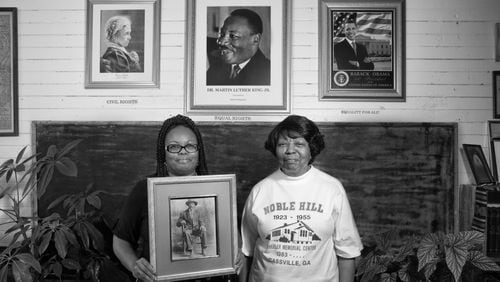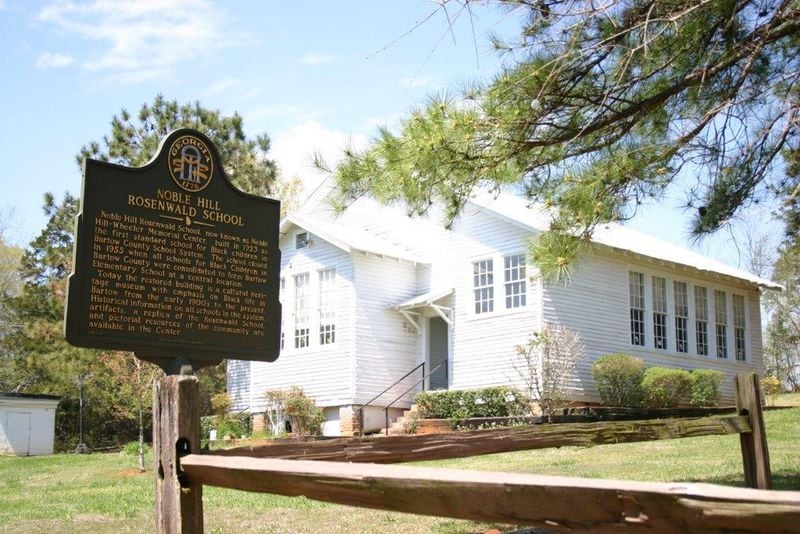It was appropriate that Martin Luther King Jr. attended Booker T. Washington High School in Atlanta.
Both men, Washington and King, helped make it possible for Black children to get an education.
The role that King played in opening schools to children of color is familiar. Less well-known is Washington’s part.
In 1912, decades before Brown v. the Board of Education, Washington teamed with Sears millionaire Julius Rosenwald to create a program that built nearly 5,000 schools for Black children in the segregated South.
The Rosenwald schools provided an education that not only lifted generations of Black America into the middle class, it also trained a phalanx of civil rights leaders, including Medgar Evers, Maya Angelou and the late U.S. Rep. John Lewis.
Of those 5,000 schools, only about 500 remain. Some are in serious disrepair. Then there is the Noble Hill School, now the Noble Hill-Wheeler Memorial Center.
The trim, white-painted two-room structure in Cassville, just north of Cartersville, was built by Webster Wheeler, a Georgian who migrated to Detroit. Wheeler’s great-great granddaughter, Marian Coleman, was one of the last graduates. Coleman went on to help save the abandoned structure from ruin, transforming it into a community center. Her niece, Valerie Coleman, is the current director of the center.
On Tuesday, in honor of the Martin Luther King holiday, Marian and Valerie will speak to a Zoom audience about a subject dear to their hearts. They are part of a country-wide effort to create a National Park unit that includes renovated Rosenwald schools, perhaps four to ten of them
The schools would serve as a way to tell this chapter of the American story, a chapter that stands as one of the most significant and successful philanthropic efforts in the history of the country.
Her center is among the schools recommended to join the park system, and “it would be a privilege” to tell that story to a national audience as a historic park, said Valerie Coleman.
While national parks are associated with canyons, mountains, rivers and other natural splendor, two-thirds of the units in the national park system are not about the outdoors.
“They are about history and people,” said Dorothy Canter, a Bethesda, Maryland, resident, a park-visiting zealot and president of the national effort to incorporate the Rosenwald schools into the system.
At such National Historical Sites as the Martin Luther King Jr. National Historical Park, one can learn history in a location where history took place. “I have learned about American history and learned to love American history because of national parks,” said Canter, who has a doctorate in biophysics and worked decontaminating federal buildings during the anthrax attacks of 2001.
Canter’s campaign has been successful in promoting legislation to fund a resource study of the 15 states where Rosenwald schools were built. The states have recommended 55 surviving schools and one teacher home to be considered for the program. (The study will be completed in about a year.)
Among those on the campaign’s board is Robert Stanton, the first African American director of the National Park Service, and a fan of Rosenwald schools.
The board also includes Atlanta photographer Andrew Feiler, whose documentary images of Rosenwald schools were collected in the book, “A Better Life for their Children,” and were exhibited at the National Center for Civil and Human Rights.
Feiler will join Canter and the Colemans on the Zoom call which is open to the public. (They are calling it a “Zoominar.”)
During the call Feiler will tell some stories about the educators and students he met during his cross-country mission to photograph every surviving Rosenwald school. “From my standpoint,” he said, “this is a Jewish American story, an African American story, a story about the role of education as the backbone of the American dream.”
Valerie Coleman said they will talk about the school groups they welcome to the Noble Hill center, the fish fries, family reunions and weddings they host, the museum of early 20th century artifacts they’ve collected, and the notable visitors they’ve entertained, including novelist Toni Morrison.
Also speaking during the Zoom call will be Stephanie Deutsch, author of the book “You Need a Schoolhouse: Booker T. Washington, Julius Rosenwald and the Building of Schools for the Segregated South” and filmmaker Aviva Kempner, creator of the documentary film “Rosenwald: A Remarkable Story of a Jewish Partnership with African American Communities.”
To register for the Zoom call, go to Moment Magazine (momentmag.com).








